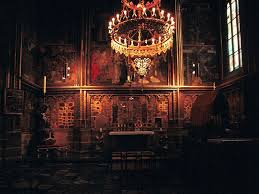Good King Wenceslas is a popular Christmas carol that tells a story of Good King Wenceslas braving harsh winter weather to give alms to a poor peasant on the Feast of Stephen (the second day of Christmas, December 26). During the journey, his page is about to give up the struggle against the cold weather, but is enabled to continue by following the king’s footprints, step for step, through the deep snow. The legend is based on the life of the historical Saint Wenceslaus I, Duke of Bohemia or Svatý Václav in Czech (907–935).
In 1853, English hymnwriter John Mason Neale wrote the “Wenceslas” lyrics, in collaboration with his music editor Thomas Helmore, and the carol first appeared in Carols for Christmas-Tide, 1853. Neale’s lyrics were set to a tune based on a 13th-century spring carol “Tempus adest floridum” (“The time is near for flowering”) first published in the 1582 Finnish song collection Piae Cantiones.
Wenceslas was considered a martyr and a saint immediately after his death in the 10th century, when a cult of Wenceslas grew up in Bohemia and in England. Within a few decades of Wenceslas’s death, four biographies of him were in circulation. These hagiographies had a powerful influence on the High Middle Ages conceptualization of the rex justus, or “righteous king”—that is, a monarch whose power stems mainly from his great piety, as well as from his princely vigor.
Although Wenceslas was, during his lifetime, only a duke, Holy Roman Emperor Otto I posthumously “conferred on [Wenceslas] the regal dignity and title” and that is why, in the legend and song, he is referred to as a “king”. The usual English spelling of Duke Wenceslas’s name, Wenceslaus, is occasionally encountered in later textual variants of the carol, although it was not used by Neale in his version. (Wenceslas is not to be confused with King Wenceslaus I of Bohemia [Wenceslaus I Premyslid], who lived more than three centuries later).

